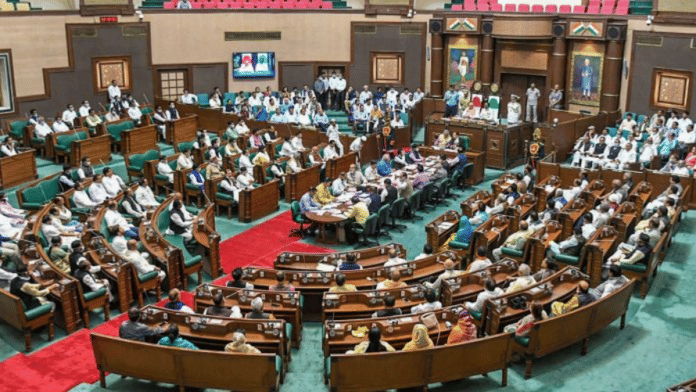Thank you dear subscribers, we are overwhelmed with your response.
Your Turn is a unique section from ThePrint featuring points of view from its subscribers. If you are a subscriber, have a point of view, please send it to us. If not, do subscribe here: https://theprint.in/subscribe/
The recurring incidents of ugly spats between the Governors’ office and the Chief Ministers’ office on various issues in the opposition ruled states have given rise to an important issue whether the conduct of the Governors’ offices is in consonance with the dignity and decorum expected of them.
The states ruled by opposition parties like Karnataka, Kerala, Tamil Nadu, Punjab, West Bengal, Delhi etc., are at loggerheads with their respective Governors for their partisan attitude and their attempts to cripple the functioning of the democratically elected governments of the states.
Returning the Bills passed by the State Legislative Assemblies with unjustified reasons or withholding assent to Bills for an inordinately longer period, over interference in the regular functioning of the state are some of the major issues causing a serious dent in the relationships of the Chief Minister’s Office and the Governor’s Office.
Some of the recent acts of the Governors of different states which lowered the dignity of the office are illustrated as follows:
Tamil Nadu
- The Governor refused to read some parts of the Governor’s address which was prepared by the State govt. and walked out of the assembly session. This is an insult to the State Government.
- He refused to reinstate Mr. Ponmudi as the Higher Education minister despite the Supreme Court’s acquittal. The Supreme Court had to issue a strong warning to the Governor to honour its order.
West Bengal
- Charges of moral turpitude against the Governor by a woman staff employed at the Raj Bhavan.
- The Governor filed a defamation suit against the CM Ms. Mamata Banerjee after the latter said that women no longer felt safe in Raj Bhavan.
Kerala
- Governor addressed the legislative assembly on the policies of the State Government by reading the first and last paragraphs, lasting less than two minutes. This was a humiliating treatment meted out to an elected Government.
- During a protest march by the SFI against the Governor, Mr. Khan sat on a State Highway in protest until an FIR was lodged against the protestors.
Jharkhand
- The Governor didn’t act on the advice of the Election Commission of India to disqualify the Chief Minister of Jharkhand for violation of electoral norms. This resulted in prolonged political uncertainty in the state.
Karnataka
Unreasonable urgency in giving clearance to prosecute the current Chief Minister in the MUDA corruption case and slow-pedalling of the request of the state government to prosecute the erstwhile Chief Minister of Karnataka betrayed the partisan attitude of the Governor.
What ails the Post of Governor in India?
- Politicians and former bureaucrats affiliated with the ruling party are appointed in several instances as Governors. This has led to questionable decisions skewed in favour of the Central Government.
2. The Governor’s continuance in the post depends on the pleasure of the President of India. This leads to arbitrary removals especially when there is change of political power at the Central Government.
3. Instead of being the “eyes and ears” of the Central Government the governors have become the ‘agents of the Centre’ as they are appointed and removed by the Central Government.
4. The discretionary power of the governor recommending the president’s rule on account of the failure of constitutional machinery in the state has not always been based on the objective assessment but on un-written directions of the powers at the centre.
5. Governors have often been accused of favouring their political masters in the appointment of CM where a single party lacked majority and also causing delay in convening and dissolution of the assembly.
6. Abnormal and inordinate delay in giving assent to the bills passed by the State Legislative assemblies.
These conflicts and political one-upmanship have tarnished the image of the functioning of the federal structure as envisaged in the Constitution and also damaged the standing of the dignified constitutional post.
The Government should take steps to implement the various recommendations of the Sarkaria Commission, Venkatachaliah Commission and Punchhi Commission with regard to selection, appointment, removal and maximum time for decision making to restore the grandeur and dignity of the august office:
These pieces are being published as they have been received – they have not been edited/fact-checked by ThePrint


